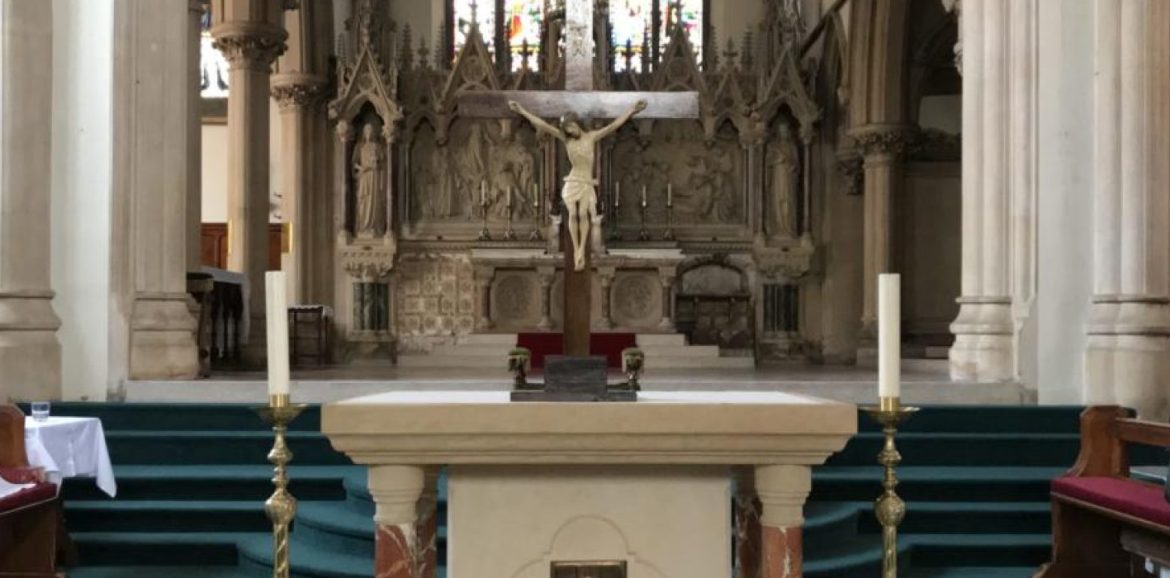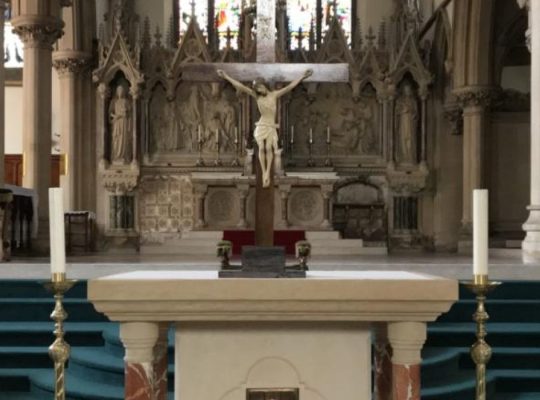If ever we have felt that our prayers don’t seem to be answered, in todays Gospel Jesus tells us to pray without losing heart; and God will respond swiftly. To-day we see Jesus continuing to teach his apostles: “He told them a parable on the necessity of praying always and not losing heart.” Thus, Jesus tells the parable of the unjust judge, which is found only in Luke.
Luke, as we have noted at various times, lays great stress on prayer. In his Second Book — Acts — he emphasises that the primitive Christian community were diligent in its practice. But discouragement can erode devotion or make it purely mechanical, thereby robbing it of its joyful spirit. To this temptation, the parable responds that prayer is never in vain. The story is wonderfully simple. The principal figure is a judge of a small town who enjoys discretionary and absolute power. He “respects neither God nor man,” being one of those who the psalmist asks: “How long will you judge unjustly and favour the cause of the wicked? Defend the lowly and the fatherless; render justice to the afflicted and the destitute. Rescue the lowly and the poor; from the hand of the wicked deliver them.” (Psalm 82:2-4)
Against this powerful man comes a widow, the type of a weak, defenceless person. What she asks is very simple: “Give me justice against my adversary” But nothing comes of it; the judge is unmoved. Yet there comes a point when he has had enough of her, persistent pestering, dreading the very thought of her coming again. With no other consideration — neither for God whom he does not respect, nor for other people whom he scoffs at, and certainly not for this woman — he decides to give justice, simply that she might stop bothering him.
This is a clear demonstration of the fact that there is a need to “pray always and not lose heart.” Not that God is comparable to such an impious judge; he himself is the Just Judge. How much more, then, will he attend to those who call to him persistently! This conclusion appears with perfect clarity. But the parables’ real conclusion is deeper.
We note first of all that the evangelist says, not “Jesus” but “the Lord said” The application of this name gives a solemn tone to the declaration, for it is the title the disciples attributes to the Resurrected Christ. Therefore, it introduces a revelation to which one must pay close attention.
In the second place, the lesson focuses not on the need to pray without losing heart in order finally to obtain one’s goal. “The Lord” declares that God does not wait for “his chosen who call out to him day and night.” He does not “give justice,” but “does justice,” “swiftly.”
“To do justice” means much more; in fact, it is something entirely different. It means “to justify,” “to renew,” “to make innocent,” “to save.” This solemn declaration of the Lord reveals the true object of prayer made, “without losing heart” and the faith which animates it. One must pray “without losing heart” in order to be “justified,” or saved. And one has, through faith, the assurance that God will realise the promised salvation “swiftly.” Consequently, discouragement can have only one cause: lack, or weakness of faith. Because one sees nothing happening, one begins to doubt God, the coming of his reign, the promised salvation. At least, one becomes so unsure as to prefer not to think about it. But no, declares the Lord. “To those who call out to him day and night” — “without losing heart” — God “will do justice.” And “swiftly.” Persistence in prayer is the key. One should not be surprised then, at the stark question that the parable leads the Lord to pose: “But when the Son of Man comes, will he find faith on earth?”
It is with this serious and tragic question that the Gospel today leaves us. A fearful question which none can evade, for it belongs to each one to respond to it personally.
This finale sheds light on the parable which, at first glance, may have appeared to be a simple lesson on the need to pray “without losing heart.” By her insistence, the widow of the parable shows that she remains profoundly convinced that the judge, though he respects neither God nor men, will eventually render her justice. It would be absurd to imagine that God, the Just Judge, is insensible to persevering prayer. Far from it! He intervenes “swiftly” to “give us justice,” to give us salvation. Thus, the issue is one of faith: faith in God who saves; faith in the Lord, the Son of Man who will come again; faith which must always be reawakened in us, without losing heart, because, without it, there is no salvation.
Jesus tells the parable of a judge who satisfies a widow who demands justice in order to show “the necessity of praying always and not losing heart.” Luke extends the teaching by adding, to a crystal clear story, a saying of the Lord which enlarges its perspective and significance. Prayer “without losing heart” is directed towards the salvation that God has promised to grant ”swiftly” to his chosen who call out to him day and night. It is therefore an act of faith in God and, in some way, a “school of faith,” for it unfolds and expresses it, while at the same time strengthening, increasing and expanding it. Thus says Saint John Henry Newman in his sermons:
“But, you ask, what are acts of faith? These are some of them. Going often to prayer is an act of faith….. Trying to be attentive to your prayers is an act of faith. Behaving in the House of God otherwise than you would in an ordinary place is an act of faith…..
These are acts of faith, because they are acts that you would accomplish if you saw and understood that God is present, though your eyes and ears neither see nor hear him. But ‘happy are they who have not seen and yet believe!’
To be sure, if we act thus, we shall, little by little, and with the grace of God be clothed with the spirit of his holy reverence. And we shall show in our way of speaking and acting, as in our religious behaviour and daily conduct, that we respect and love him. Not by constraint and weary effort, but spontaneously and naturally.”
We can do nothing without God’s help, and if we feel that he is not listening; he is, if we feel that he is taking his time in answering, perhaps he is, it is his prerogative. But remember we think as man thinks not as God thinks. We are his children, he, a loving Father who always knows best. We should constantly pray and hang on to his every word.
Without faith and prayer, who can withstand the assaults of the enemy who is always ready to assail us? “Remember Amalek!” In the first reading. You will only have the advantage by placing yourself under “the banner of God,” the sign raised over the world. This admonition, directed to the Church and every believer, never ceases to resound.
“ God of Holiness, You have the power to make us strong by your grace and vigilant by the strength of the Gospel. Remember us in the fight of prayer, when we begin to lose heart, and keep us faithful in meditating on your word. Thus, we fervently await the coming of your Son, Jesus, our Lord, through whom we pray. Amen.”
“To you I call; for you will surely heed me, O God; turn your ear to me; hear my words. Guard me as the apple of your eye; in the shadow of your wings protect me.”


